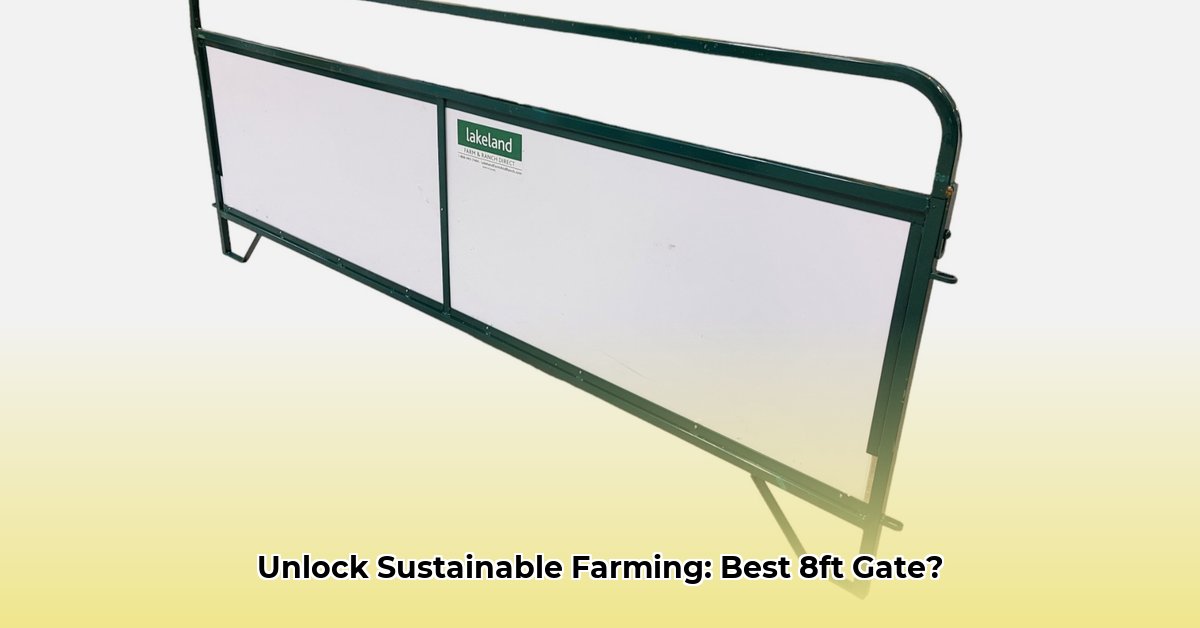
Selecting the Right 8-Foot Gate for Your Farm
Choosing the right 8-foot gate for your farm is a crucial decision impacting efficiency, animal welfare, and long-term sustainability. Tractor Supply offers various options, each with pros and cons. This guide helps you navigate these choices, focusing on factors like durability, cost-effectiveness, and environmental impact. We'll examine two common types: wire mesh and tubular steel gates. For smaller gates, check out these options.
Wire Mesh Gates: A Budget-Conscious Option
Wire mesh gates often appeal to farmers seeking an economical solution. Their lighter weight simplifies installation, and their open design allows for easy animal monitoring. However, these advantages come at the expense of durability and longevity.
Pros of Wire Mesh Gates:
- Lower Initial Cost: Significantly cheaper than steel alternatives.
- Easier Installation: Lighter weight reduces installation effort and time.
- Good Visibility: Offers unobstructed views of livestock.
Cons of Wire Mesh Gates:
- Shorter Lifespan: Prone to rust, damage, and requires frequent replacement—potentially negating initial cost savings in the long run.
- Limited Strength: May not adequately contain larger or stronger animals.
- Reduced Security: Offers less protection against livestock escapes or external threats.
Tubular Steel Gates: A Durable, Long-Term Investment
Tubular steel gates represent a higher upfront investment but offer superior durability and longevity. Their robust construction makes them ideal for withstanding harsh weather conditions and vigorous animal activity. While the initial cost is greater, the extended lifespan translates to significant long-term savings.
Pros of Tubular Steel Gates:
- Exceptional Durability: Withstands harsh weather and aggressive animal behavior.
- Longer Lifespan: Requires less frequent replacement, minimizing long-term costs.
- Enhanced Security: Provides superior containment and protection against livestock escapes.
Cons of Tubular Steel Gates:
- Higher Initial Cost: Substantially more expensive than wire mesh gates.
- More Demanding Installation: Heavier weight requires more effort and potentially assistance.
- Reduced Visibility: Offers less clear visibility of animals compared to wire mesh.
Comparing Gate Options: A Side-by-Side Analysis
The following table summarizes the key differences between wire mesh and tubular steel gates:
| Feature | Wire Mesh Gate | Tubular Steel Gate |
|---|---|---|
| Initial Cost | Significantly Lower | Significantly Higher |
| Durability | Low; susceptible to rust and damage | High; exceptionally resilient |
| Lifespan | Short; frequent replacement anticipated | Long; extended service life expected |
| Installation | Easy; minimal effort required | More demanding; may require assistance |
| Security | Low; easily compromised | High; robust security against escapes |
| Visibility | Excellent; unobstructed view | Reduced; partial obstruction |
Lifecycle Cost Analysis: The True Measure of Value
The initial purchase price isn't the sole determinant of a gate's true value. Lifecycle cost, encompassing the initial investment, maintenance expenses, and eventual replacement costs, provides a more comprehensive evaluation. A higher initial cost might offer substantial savings in the long run by requiring fewer replacements. For example, a tubular steel gate with a 10-year lifespan could prove more economical than a wire mesh gate needing replacement every 2-3 years.
Choosing the Right Gate: Key Questions to Ask
Before purchasing, consider these crucial questions:
- Budget: Determine your financial constraints and weigh them against long-term costs.
- Lifespan Requirements: Assess the necessary lifespan to justify the initial investment.
- Livestock Type: Select a gate robust enough to contain your specific animals.
- Security Needs: Prioritize security against potential escapes or external threats.
- Environmental Factors: Consider the impact of weather conditions on gate longevity.
Sustainability Considerations: Environmental Impact and Long-Term Costs
Sustainable farm practices extend to infrastructure choices. Selecting gates with longevity and minimal environmental impact contributes to responsible farming.
Key Considerations for Sustainable Gate Selection:
- Material Durability: Prioritize materials that resist degradation and require minimal maintenance, maximizing lifespan and reducing waste.
- Material Sourcing: Choose recycled materials whenever possible, reducing reliance on virgin resources. Look for certifications like FSC for sustainably harvested wood.
- End-of-Life Management: Select gates that can be easily repaired or recycled at the end of their lifespan, minimizing landfill waste.
By considering these factors, you can choose a gate that aligns with your sustainable agricultural practices. Remember that a longer-lasting, more durable gate, even with a higher initial cost, will likely be more economical in the long run.